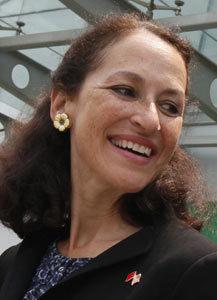SHANGHAI - The head of the US Food and Drug Administration (FDA) said on Friday that China is improving its oversight of exporters in a bid to root out problems ranging from the contamination of its dairy products to the safety of pharmaceutical exports.
 Margaret Hamburg
Margaret HamburgFDA Commissioner Margaret Hamburg said Chinese officials she spoke with during her first weeklong visit to China since being appointed were pursuing a "common agenda" to improve manufacturing practices and regulation of complex supply chains for the food and drug industries.
"I leave feeling very encouraged by the partnership we've developed here," Hamburg said.
"This is a priority for China, as it is for the United States," she said.
Hamburg spent several days in Beijing meeting with pharmaceutical and food industry leaders, regulatory counterparts and faculty staff from Peking University before flying to Shanghai and touring the laboratory of the city's food and drug watchdog.
"I have been impressed by the eagerness of the regulatory authorities here to work with us, to strengthen controls," Hamburg said.
"We have talked about opportunities to strengthen some critical components of the drug-manufacturing process and the food-processing capabilities.
"Our Chinese counterparts have been very interested in working with us to strengthen their systems to learn more about best practices and to ensure open channels of communication to identify emerging issues or concerns so they can be swiftly and effectively addressed."
She described this as part of a broader move to create a global community of regulators capable of working together to meet the challenges of globalization by harmonizing their standards and approaches.
The FDA has set up offices in three Chinese cities and is cooperating in many areas, including training and joint inspections.
Hamburg said she spent much of the week addressing key issues such as how to gain better access to supply chains and the importance of accountability at each stage.
Confidence in China's dairy industry was undermined by a scandal involving melamine illegally added to infants' milk powder in 2008. More recently, it was further damaged by reports that another Chinese-produced brand of milk powder may be causing premature breast development among girls in south-central China.
The government introduced a new Food Safety Law in June 2009 with tougher punishments.
"The problem with melamine contamination of dairy products, and in pet food, was certainly a wake-up call to the Chinese government and to all of our countries," said Hamburg.
"So, I think the Chinese government took it very seriously (it) has put in place new screening tests to monitor and watch for this problem and has continued to take action against products that have contamination."
Hamburg was appointed by US President Barack Obama in the middle of last year to overhaul the $2-billion agency after it was marred by a series of health scares, including tainted peanuts and dangerous medicines such as Vioxx, a painkiller that was dubbed by some "the poison pill".
China, a huge exporter of pharmaceutical components to the US, is now awaiting approval from the US watchdog for a herbal remedy for angina produced by Tianjin-based Tasly International. Called Compound Danshen Shipping Pill, it is the first Chinese patented traditional medicine to pass the US FDA's strict Phase II trials.
AP contributed to the story.
>





